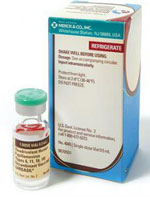 |
| Merck's Gardasil |
Research has shown that human papillomavirus (HPV) vaccines don't lead to risky sex. But that doesn't mean they pass every patient's morality test. On the contrary, moral concerns about Merck's ($MRK) Gardasil were the greatest barrier to immunization among college freshmen, a Michigan study found.
More than 91% of 18- and 19-year-old students surveyed at Grand Rapids-based Grand Valley State University pointed to a composite of morality-related issues when addressing perceived barriers to receiving Merck's jab, MedPage Today reports. While some upheld the belief that vaccination promoted sexual behavior--despite a growing body of evidence suggesting otherwise--others said receiving Gardasil conflicted with their moral or religious beliefs, or their parents' opinions.
"Vaccination continues to be a controversial topic for parents as rumors swirl through the mass media about the false complications associated with the vaccination," the researchers wrote, as quoted by MedPage. "As providers, it will be important to impart the most recent guidelines to patients and their families so they have the information they need to make informed decisions."
Though Gardasil managed to pull in $1.83 billion in 2013--a 12% increase over 2012--it has struggled with uptake, prompting the CDC to look into the issue last year. In a 2013 study published by JAMA Pediatrics, researchers found that only about 54% of girls received at least one dose of an HPV vaccine in 2012 despite the shot's ability to protect against cervical cancer.
Numbers from Grand Valley fall right in line with that statistic, with 51.4% reporting that they received at least one dose and 40.4% reporting they received all three. But it wasn't just conscience that held students back; more than half of respondents cited lack of education as a barrier to vaccination, and over a quarter highlighted lack of physician recommendation, among other factors.
Researchers pinned the information gap on health education classes in middle and high school, where students reported learning most of what they know about the shot.
"Because health education classes in an adolescent's education have played such a large role in study participants of this generation gaining health-related information, it is important as providers to encourage education through this avenue," they wrote.
- get more from MedPage Today
Special Reports: Top 10 best-selling vaccines of 2013 | Top 5 Vaccine Companies by Revenue - 2012 - Merck | 20 Top-selling Vaccines -- H1 2012